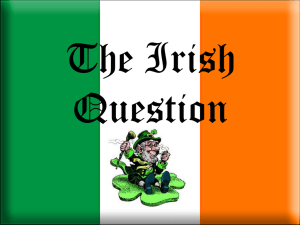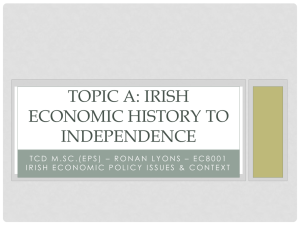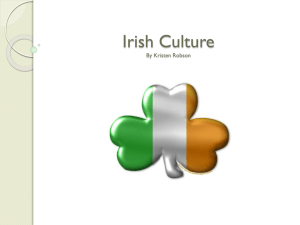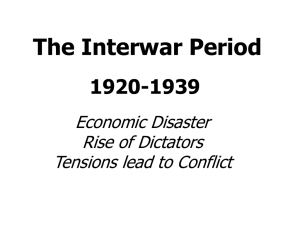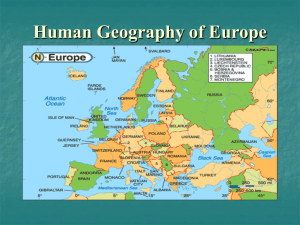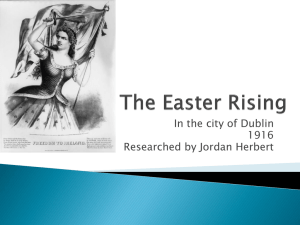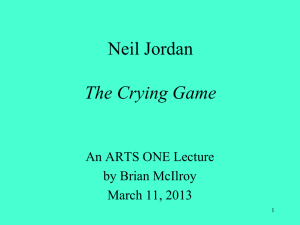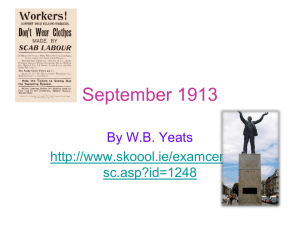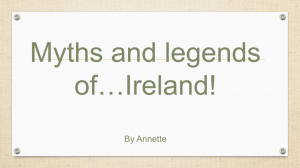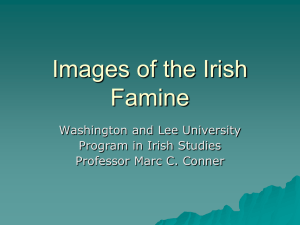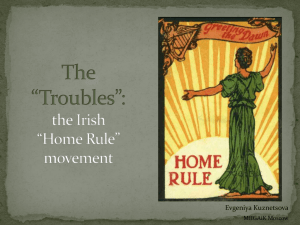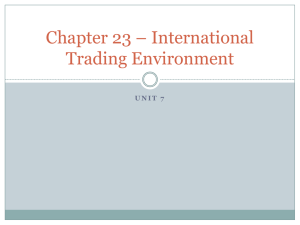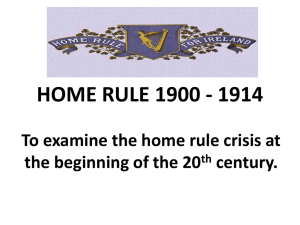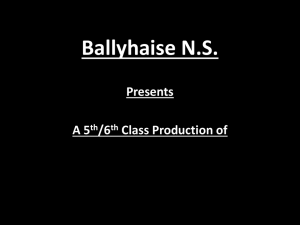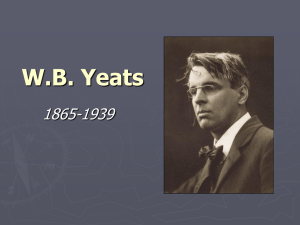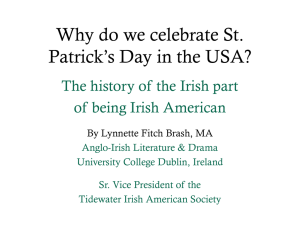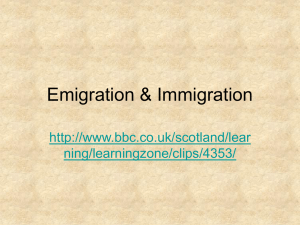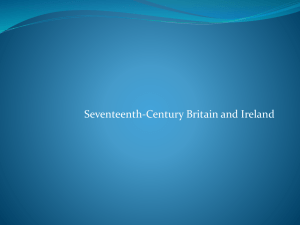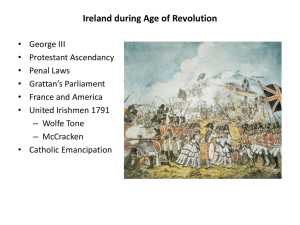The Irish question
advertisement
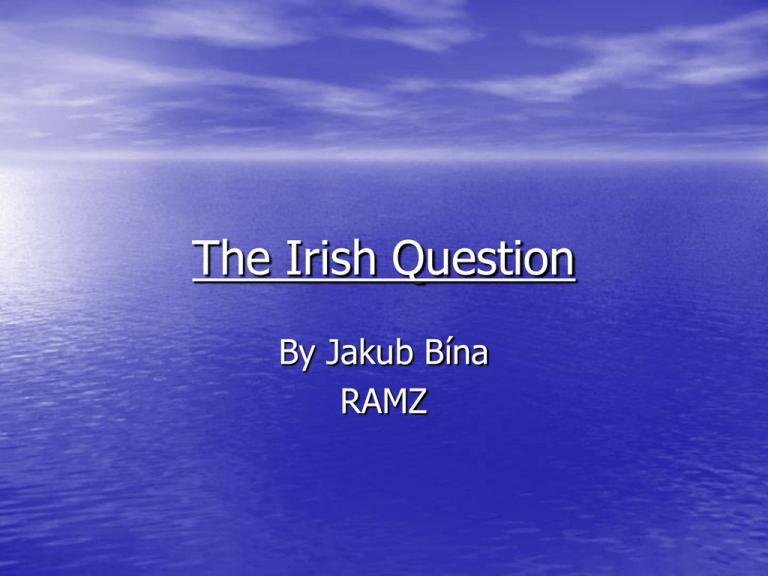
The Irish Question By Jakub Bína RAMZ What is The Irish Question? • Complex problem • Dates back to twelfth century when England • • imposed a feudal landowing system on Ireland Feudal lords (noblemen) were granted large tracts of land The landowners (mostly English) became wealthy, while the farm workers and other laborers (Irish) lived in great powerty What is The Irish Question? • Great social problems came • • • • • during the 1600s and 1700s The English tried to impose Protestantism Ireland had a mainly Catholic population Irish Catholics rebelled agains English and Protestant domination Events like Irish Catholic rebellion (1641) and civil war came Oliver Cromwell re-conquered Ireland killing 1/3 of Irish Catholics What is The Irish Question? • Food tended to be produced for export rather than for domestic needs • Two very cold winters led directly to the Great • Irish Famine (1740-1741) killing over 400 000 people In 1801 the Act of Union came, which merged Kingdom of Ireland and the Kingdom of Great britain to create the United Kingdom What is the Irish Question? • The second of Ireland's "Great Famines"struck • the country severely in the period 1845-1849, leading to mass starvation and emigration. It was named Irish Potato Famine. The impact of emigration in Ireland was great; the population dropped from over 8 million before the Famine to 4.4 million in 1911. What is the Irish Question? • A series of violent rebellions by Irish republicans took place in 1803 • In 1848 a rebellion by Young Irelanders and in • • 1867 by the Irish Republican Brotherhood- All failed… Tension between nationalists and unionists (northeast- Protestants, industry, wealth) But most of the island was Catholic and nationalist What is The Irish Question? • As the First World War broke out, a failed attempt was made to gain separate independence for Ireland in 1916, called Easter Rising • In the December 1918 elections most voters voted for Sinn Féin, the party of the rebels. Having won threequarters of all the seats in Ireland • On 21. 1. 1919 Irish Republic parliament was established, trying to gain indipendence of the country • The Irish Republican army started a fight against the British (1919-1921) What is the Irish Question? • During this war the island was divided into two • • • parts- "Northern Ireland" and "Southern Ireland„ In mid-1921, the Irish and British governments signed a truce that stopped the war In December 1921, representatives of both governments signed an Anglo-Irish Treaty. The Irish delegation was led by Arthur Griffith and Michael Collins. This established the Irish Republic and created the Irish Free State Northern Ireland could stay within the United Kingdom and it did so Political map of Ireland. What is the Irish Question? • Many people emigrated the new country in • • • • 1920s due to great powerty Also lots of Protestants left the Catholic country, because they felt unwelcomed The country stayed neutral during WW2 In 1949 the state was formally declared the Republic of Ireland and it left the British Commonwealth In 1990s the Republic of Ireland gained big economical strengh- ‚Celtic tiger‘ What is the Irish Question? • Northern Ireland- a ‚a protestant state‘ • The founding Prime Minister, James Craig, proudly • • • declared that it would be ‚a Protestant State for Protestant People‘ Tensions came to a head with the events of Bloody Sunday and Bloody Friday, and the worst years (early 1970s) of what became known as The Troubles resulted. Private armies such as the Provisional IRA, the Official IRA, the INLA, the Ulster Defence Association and the Ulster Volunteer Force Fights against the British army and Unionists- 3000 dead people What is the Irish Question? • During the 1970s British policy concentrated on • • • • • defeating the IRA by military force 1986- Anglo Irish Agreement signaling a formal partnership in seeking a political solution. In the 1990s- progress towards peace 40% population of Northern Ireland are Catholics the Belfast Agreement (‚Good Friday Agreement‘) of April 10, 1998 brought a degree of power sharing to Northern Ireland, giving both unionists and nationalists control of limited areas of government The situation is hopefully taking a peaceful way… ……………………………… Thank U for attention
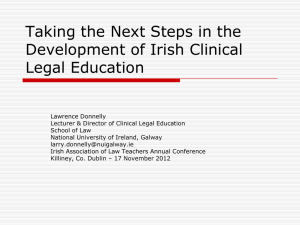
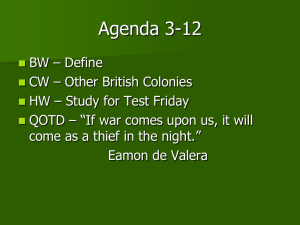
![South east presentation resources [pdf, 7.8MB]](http://s2.studylib.net/store/data/005225551_1-572ef1fc8a3b867845768d2e9683ea31-300x300.png)
